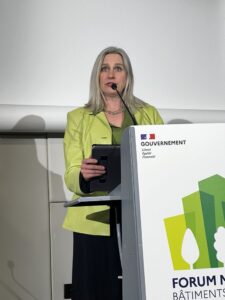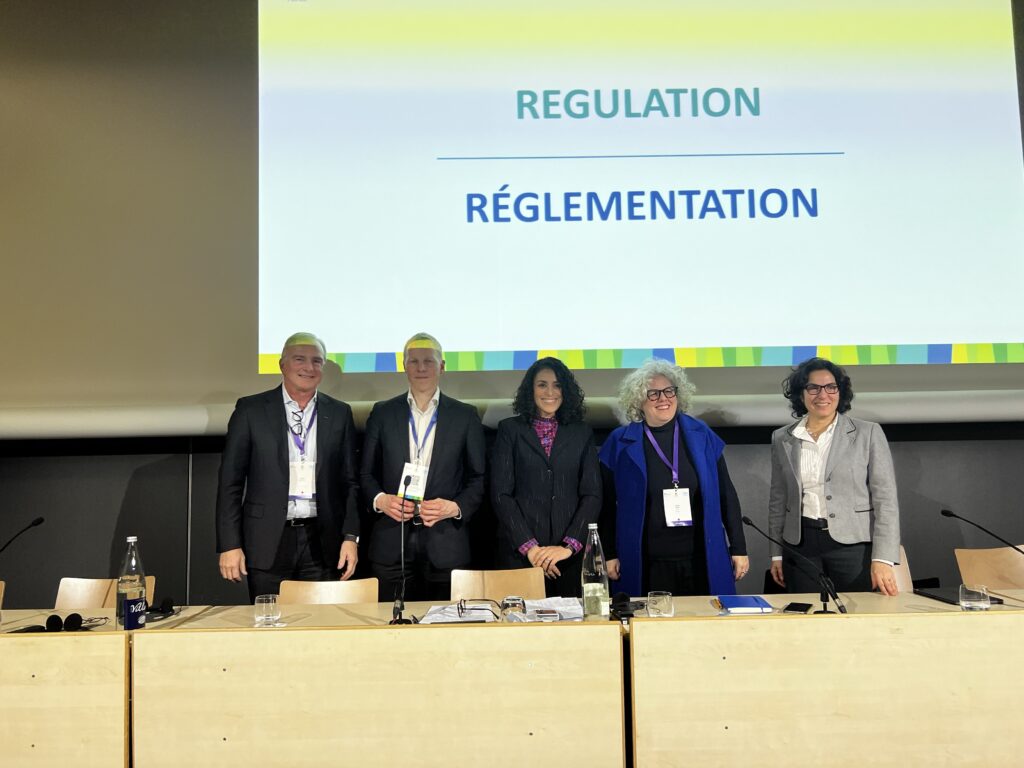
International Code Council Plays an Active Role in Inaugural Buildings and Climate Global Forum
Construction ministers and industry professionals from around the world met in Paris to collaborate on finding solutions to increase the sustainability and resilience of the built environment.
Earlier this month, I joined International Code Council CEO Dominic Sims and Code Council staff in Paris for the inaugural Buildings and Climate Global Forum, hosted by the French Government and the Global Alliance for Buildings and Construction (GlobalABC).
When the GlobalABC was established after the Conference of the Parties (COP) in 2015, one of the ultimate goals was to connect construction ministers from around the world to collaborate on finding solutions to increase the sustainability and resilience of the built environment. Through subsequent annual COP meetings, and most recently at COP28 in December 2023 where the Buildings Breakthrough was officially launched, the Buildings and Climate Global Forum finally materialized.
Advancing Building Sector Adaptation and Collaboration
The official sessions of the Forum occurred over two days, but external stakeholders were encouraged to schedule side events in the few days leading up to the Forum on March 7-8, 2024. The International Code Council, which is an active member of GlobalABC and co-chair of its Adaptation Working Group, participated actively in the planning and execution of both the official and side events held in Paris. Being a firm believer in the importance of collaboration and learning from our global counterparts, I participated in as many sessions as I could.
Highlights included the GlobalABC Adaptation Working Group meeting, where we discussed advancing the plan for adaptation outlined in the recently-released white paper, Why Are We Not Adapting?, among all stakeholders along the buildings and construction sector.
Adaptation, the work of ensuring our buildings are safe and protected against the hazards they are likely to face throughout their life span, is gradually gaining recognition alongside greenhouse gas (GHG) mitigation and energy efficiency in discussions about the role of the buildings sector, especially with the evolving climate and hazard maps. This is a particularly important conversation for the International Code Council, since the International Codes® (I-Codes), along with our family of solutions, are key tools in ensuring that buildings are safe and resilient.

I also attended a full-day workshop presented by the U.S. Green Building Council, the UK Department of Sustainability and Net Zero and the Enniscorthy Forum which explored the policies driving whole life cycle decarbonization, building-grid integration, data and harmonization efforts. These are challenges that many communities are considering, and I saw great value in understanding how governments, non-profits and the private sector are approaching these emergent issues. This active workshop generated new ideas and fostered collaboration among a very diverse group of stakeholders, including national and local governments, standards organizations, nonprofit organizations and material industry representatives.
Also in conjunction with the Forum, the most recent Global Status Report for Buildings and Construction (“Buildings-GSR”) was released by GlobalABC. This annual publication tracks the evolving role of the buildings and construction sector in global GHG emissions. It uses metrics to monitor the sector, which accounts for 37 percent of global operational energy and process-related CO2 emissions, against the targets that the national and sub-national governments have agreed upon under the Paris Climate Agreement to limit global temperature increases to 1.5 degrees Celsius by 2100. The findings of the report were not positive, concluding that a lot of collective work remains to be done across the buildings and construction sector. For example, less than half of countries have mandatory energy codes, and many jurisdictions around the world lack the capacity to effectively enforce the building and energy codes that they have adopted.
Global Impacts and Commitments for Sustainable Construction
The official Forum was impressive because construction ministers (if a country has one – the U.S. was represented by the Department of Housing and Urban Development) are traditionally domestically focused without impactful interaction with their global counterparts.

The French Government managed to gather 1,450 participants from 76 countries. Over 190 speakers were recruited to share knowledge during 20 thematic sessions, 10 high-level dialogues and four plenary sessions. At the end of the event, the text of the Declaration de Chaillot was released, along with the endorsement of 70 countries. The Declaration aligned nicely with the findings of GlobalABC’s Buildings-GSR.
The Declaration acknowledged that the increasingly frequent and severe weather patterns that we have witnessed will continue, increasing the exposure of buildings to risks, especially in already vulnerable communities located in emerging economies. The Declaration also emphasized the urgent need to act as the global population in cities continues to increase, driving demand for raw materials for resilient and sustainable buildings.
The signatories to the Declaration, all national government representatives, specifically committed to:
- Implementing roadmaps, regulatory frameworks and mandatory building and energy codes to move towards carbon-neutral buildings
- Implementing an appropriate financial framework with financial and fiscal incentives and regulatory tools to increase the share of resilient, near-zero emission and affordable buildings
- Promoting the adoption of labels, standards and certifications
- Leading by example by adopting ambitious policies regarding public procurement
- Promoting the production, development and use of low-carbon, durable and cost-effective construction materials
- Promoting collaborative value chains, as well as research and development of innovative solutions
- Improving skills by strengthening local know-how, considering mitigation and adaptation strategies
- Developing multi-level governance, coordination among different stakeholders and a more participatory approach to ensure coordination of implementation
- Developing tools and regulatory frameworks to collect and share data and best practice
To enable governments around the world to adhere to these commitments, stakeholders across the value chain – including civil society non-government organizations like the International Code Council – will need to stay engaged, both to participate in the dialogue and represent the view of our members and stakeholders, but also to offer the available tools and solutions that can be leveraged around the world to advance this common initiative.
It was clear to me that the International Code Council is already offering a well-respected voice in this dialogue, and the Forum provided a meaningful opportunity to introduce ourselves and our solutions to government representatives from every continent.
I appreciated the opportunity to make connections with many of our existing partners, like designers, collaborators and users of our solutions from the U.S., as well as some of our global partners like the Pakistan Engineering Council, Standards Australia and GlobalABC.
Over the four days of the Forum and pre-forum events, the size and gravity of the challenge we all face was made abundantly clear. But so was the passion and commitment that each participant brought to the discussions. I left the Forum both challenged and inspired, and I find myself repeatedly returning to the phrase, if you want to go fast, go alone; if you want to go far, go together.
The recordings of all of the sessions are now available on a dedicated YouTube channel. International Code Council speakers are featured in the following sessions:
- Stakeholders’ Plenary
- High-level dialogue – Regulation
- Thematic session – Harmonizing policies for whole-life carbon and resilient building goals
- Thematic session – Achieving climate-resilient buildings
- High-level dialogue – International cooperation – Buildings Breakthrough
Read more about the International Code Council’s participation at COP28 to advance building solutions for climate mitigation and adaptation, here.






